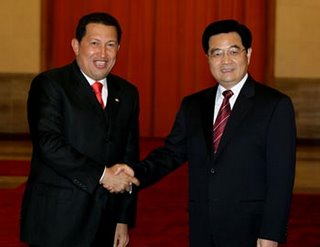 Associated Press Business News: Venezuela Says China Backs U.N. Bid - MSN MoneyChina, Venezuela ink 8 agreements to boost bilateral ties
Associated Press Business News: Venezuela Says China Backs U.N. Bid - MSN MoneyChina, Venezuela ink 8 agreements to boost bilateral tiesI have been totally caught off guard by the recent headlines coming out of Beijing, which is currently courting Hugo Chavez and his countries vast oil reserves using uncharacteristically audacious public diplomacy to emphatically embrace their lone legitimate Communist Ally. Several major agreements have been brokered recently which have clearly been launched with the intention of legitimizing the Venezuelan government as it aspires to bolster its regional and global profile. In addition to the recent announcement of support for Venezuela's bid for a seat on the UN Security Council, which is also supported by Moscow, the two Communist allies inked pacts on issues ranging from housing to oil. Chavez has declared that by 2009 China will receive 500,000 barrels of oil per day from his country, with that number reaching 1 million sometime next decade.
I don't see any reason why the US shouldn't support Venezuela's bid for a Security Council seat- for what better place is there to humble a spirited populist like Chavez. I would take John Bolton over Hugo Chavez in a cage fight (which is how I like to refer to Security Council sessions) any day.
Chavez has been emboldened by electoral victories and his government has made great efforts to brand itself recently as the most virulently anti-American in the western hemisphere, which has brought them the respect and financial incentives from the East, specifically Russia and China. Venezuelan oil ministers have recently threatened to cut-off shipment to the US if their is suspicion of subversive tactics by the CIA or any other US-backed anti-Communist activists in the country.
Statistics for the first four months of 2006 put the total Venezuelan import figure at roughly 1.5 million barrels per day, which is far greater than Chavez has yet promised to Beijing, but that number is down from the 1.7 million barrels during the mid-1990's. If Caracas continues to divert exports typically bound for the US to Beijing, there will be a marked increase in the price of gasoline across the United States. I think the best policy would be for the US consumer to recognize the overtly hostile rhetoric of the Venezuelan President and make the conscious decision to not contribute to the coffers of a clearly irresponsible individual. CITGO is the Venezuelan state-owned oil company, and for this reason I never buy gasoline from a CITGO station. I call on all American's who care about the future of gas prices and the security of the US economy to join me in my boycott, and tell a friend.
 Image via WikipediaImage via Wikipedia- Google News-- Chinese Success Creates New Paradigm for Developing Nations
Image via WikipediaImage via Wikipedia- Google News-- Chinese Success Creates New Paradigm for Developing Nations![Reblog this post [with Zemanta]](http://img.zemanta.com/reblog_e.png?x-id=ec249feb-a691-4caa-8805-665ac6c0d9fe)
